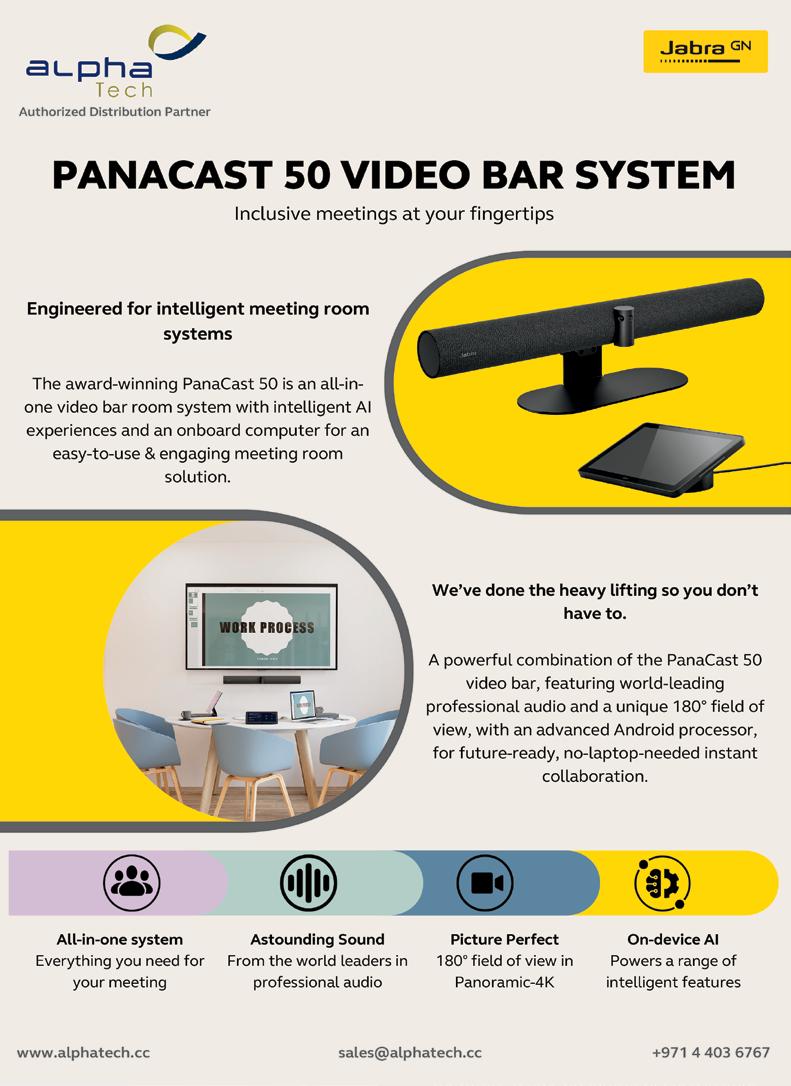























































In a world shaped by the relentless march of technology, the emergence of Smart Cities stands as a testament to human innovation. These urban landscapes, interwoven with digital infrastructure, hold the promise of reshaping our future. Smart Cities, a convergence of datadriven insights and Artificial Intelligence, present boundless opportunities. Through predictive models and efficient resource management, they redefine urban living.
Yet, progress comes with challenges. Cybersecurity takes precedence as these cities thrive in the digital realm. Managed Detection and Response (MDR) solutions become the shield against evolving threats, ensuring the safety of citizens and their data. The past decade has witnessed an alliance between Smart Cities and AI that has propelled transformation. From intelligent traffic management to climate pattern predictions, the partnership enriches sustainability and resilience.
In this issue, with the tapestry of Smart Cities, we explore the potential of Web3-powered solutions, the necessity of cybersecurity in urban planning, and the fusion of business with sustainability. Our journey also extends to NEOM, echoing boundless possibilities, and uncovers insights and solutions that cement the Smart City foundation. Amidst the dawn of a new era driven by generative AI and privacy-centric browsing, Smart Cities stand as beacons, guiding us towards an intricately connected future.
Vivek Sharma Founder Vivek Sharma FounderAdil Siddiqui Head of Media
Srijith K N Assistant Editor
Faiz Ahmed Graphic Designer
Priyanshu Ranjan Sales Head

Sakshi Sindwani
Sr. Media Sales Manager


Gladwyn Pereira
Sr. Media Sales Executive
Zain Fazal Sankay
Media Sales Executive
Arbaaz Khan
Media Sales Executive


Sidra Kamal Content Contributor
Suneeta Dadwani

Business Coordinator
OMA House, P.O. Box: 3314, Sharjah, UAE. Tel: +971 6 573 0000 | www.VARonline.com


For All Inquiries: jns@omaemirates.com Mobile: +971 56 404 0503
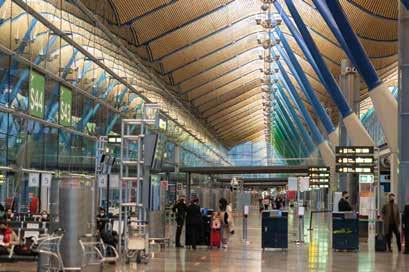






Airports fall among the busiest places in the world, and waiting times can often be long and frustrating. However, the rise of smart airports is helping to change that. Smart airports use smart technology to improve efficiency and reduce waiting times. Taking the UAE as an example, the acquisition of Smart Gates has reduced residents’ waiting time by 30%.
Process optimization is another critical way that smart airports are reducing waiting times. This involves streamlining and automating as many processes as possible. For example, self-service check-in and baggage drop-off can help to reduce the number of people waiting in line at traditional counters.
The use of AI for video surveillance is growing in the GCC region. The increase in demand for security in the region and the growing adoption of smart city technologies are helping in driving this growth.
Countries across the Middle East and Africa invest heavily in digitization to improve their infrastructure and services. With the numerous innovations taking place in the region to build smart cities, transportation, and airport facilities, the region is intensely working towards becoming a global leader in the tech space.
The MEA Smart Airport Market alone is expected to grow significantly in the coming years, from USD 380.47 million in 2023 to USD 700.68 million by 2028. This growth is driven by several factors, including
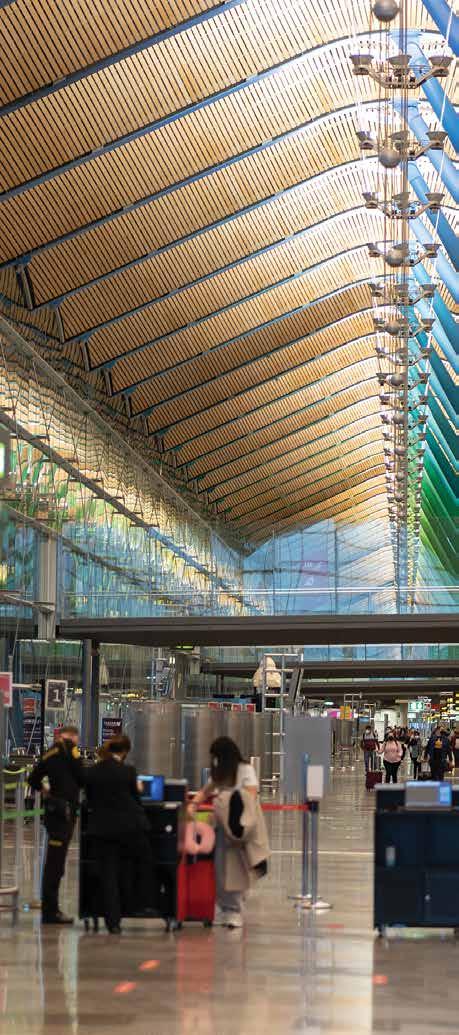
increased air travel traffic in the region, improved airport security, and the desire to provide passengers with a more convenient and enjoyable travel experience.
Video analytics is also playing a role in streamlining airport processes. Video cameras can be used to track the movement of passengers and identify potential concerns. Moreover, data-driven video analytics can help direct passengers to the shortest queues or reroute them to different checkpoints if necessary.
Smart airports in the GCC region use digitalized infrastructure, customizable video wall solutions, and scalable video to improve efficiency and reduce waiting times. The digitalized infrastructure allows airport operators to monitor and control all aspects of the airport from a single location. Customizable video wall solutions enable airport operators to display critical video data on multiple screens, which can help them to monitor security, traffic, and other vital aspects of the airport. Scalable video ensures that even airports in remote locations can benefit from the latest smart airport technologies. Scalable video can be used to create a virtual network that connects all different parts of an airport, giving airport operators a real-time view of the entire airport, regardless of size or location. The use of smart airport technologies is still in its early stages, but it can potentially revolutionize how airports operate. By streamlining waiting times and improving efficiency, smart airports can make the travel experience more enjoyable for passengers and airport operators.
However, it doesn’t just end there. The benefits of smart airports also include:
• Reduced operational costs: Smart airports can reduce operating costs by optimizing resource utilization, energy efficiency, and streamlined processes.
• Improved security: Smart airports can use technology to improve safety by detecting and preventing threats, such as unauthorized access and terrorist attacks.

• Enhanced passenger experience: Smart airports can provide passengers with a more personalized and convenient travel experience by offering self-service check-in, baggage drop-off, and boarding.


streets every year to add infrastructure for each new application. For example, one city installed basic security cameras on light poles but did so without installing fibre connectivity that would enable adding small cells to those poles or implementing facial recognition applications for the cameras. To avoid having to upgrade networks in the future, city planners are now educating themselves about future possibilities.
The process of fibre network convergence is primarily driven by the development of enabling technologies, user demand, and service providers’ capabilities. Large incumbent service providers have both wireline and wireless operations, so converging onto a single network and maximising asset utilisation makes excellent business sense.
No matter how you look at it, the future is connected. If the past few years (especially the past few months) have proven anything, data processing will only grow exponentially.
As data connectivity is becoming the fourth utility after water, gas, and electricity in cities across the Middle East, businesses and homes across the region are rushing to implement it.
Companies have traditionally built specific, siloed applications like surveillance cameras, smart lighting, or traffic sensors. It only makes sense; otherwise, the city is digging up the same
Real-life examples have occurred where a fibre-to-the-home (FTTH) network was built, and several months later, the same construction crew dug up the same street to lay fibre for a cell site, which is wasteful and disruptive. Network convergence would mean one build-out that could be used for multiple service delivery platforms, including FTTH.
As governments work with network operators to begin this exciting technological transformation, it is all about ubiquity and reliability with faster speed and low latency. Whether the technology is used for healthcare, education, or training government leaders, 5G will be an information superhighway, connecting everything, everywhere, all the time.
















You could be forgiven for thinking that “Smart Cities,” those digital utopias full of automatic street lights and self-emptying garbage bins, are as outdated as skinny jeans and Warby Parker frames.
The concept, which popularized a new vision of the government-citizen interface, defined by universal wi-fi, app-based city services and shared data, powered by public-private partnerships with global technology companies, was born out of the 2008 financial crisis.
Dubai was an award-winning leader of the Smart City movement. Smart Dubai was launched in 2014 with a vision to make Dubai the happiest city on earth, by way of technological innovation. Smart Dubai introduced DubaiNow, the unified app for all government services; launched the Dubai Data initiative to streamline and synthesise government data.
So where does that leave smart cities today?
Digital government infrastructure was put to the ultimate test during the height of the COVID-19 pandemic. Cities that were able to seamlessly transition to digital services minimized disruption to daily needs and realized an inestimable impact from digital connectivity on community resilience.
Now, a new wave of digital disruption is challenging city leaders to imagine anew the relationship between government, technology and citizen services.
Long before Mark Zuckerberg rebranded Facebook to Meta and Elon Musk turned Twitter into X, artificial intelligence and digital twins were favorite talking points of smart city pioneers. Now that the technology is here, what will city leaders do about it?
Metaverse technology holds enormous potential for city leaders. Using spatial computing to manipulate a 3D model of the city, also known as a digital twin.

The combined powers of a digital twin city connected to live data from an IoT network, run through a generative AI program to analyse patterns and implement solutions in real-time, paints a tantalising picture of a new smart city that is able to, essentially, run itself.
The public has already seen the real power of AI, through programs like ChatGPT and a myriad other. It will be only a matter of time before they turn their attention to government services and wonder, “shouldn’t my city be able to do that?”
City leaders will need to be ready. It’s time to get smart.
CITY LEADERS WILL NEED TO BE READY. IT’S TIME TO GET SMART.
The pace of urbanization is rapidly increasing worldwide, with projections indicating that more than two-thirds of the global population will be living in cities by 2050. As cities grow, they face a multitude of challenges, including pollution, traffic congestion, and crime.
The Covid-19 pandemic has shed light on the vulnerabilities of urban spaces, as the virus spreads easily in densely populated areas and travel hubs. In fact, over 95% of Covid-19 cases have been reported in urban regions. So, what exactly is a smart city? Essentially, it's an urban area that leverages artificial intelligence (AI) and the Internet of Things (IoT) to collect data from various sources, such as people, devices, and buildings. This data is then analyzed to optimize various aspects of city life, including infrastructure, traffic management, air quality, waste disposal, and more. Smart cities are essentially intelligent networks of cloudconnected assets that can communicate and interact with each other.
The integration of AI and IoT in smart cities offers a multitude of benefits:
1. Energy Efficiency: AI can monitor a city's energy consumption and identify inefficiencies, leading to optimized energy usage and reduced costs.
2. Improved Air Quality: Real-time monitoring of humidity, pollution levels, and air pressure allows cities to take proactive measures to improve air quality.
3. Traffic Management: Smart traffic lights can respond to traffic flows, IoT systems in vehicles can sync with electric charging points, and real-time maps can assist in finding available parking spaces, thereby reducing traffic congestion.
4. Enhanced Waste Management: Smart garbage bins can transmit data on fill levels, enabling waste management companies to provide timely and optimized collection services.
In the post-Covid era, the significance of AI and IoT in smart cities will increase, with a focus on health and sustainability. City leaders are already embracing digital transformations and reevaluating their priorities.
For instance, in London, a system initially designed to monitor lockdown compliance by tracking vehicle numbers is now being utilized as an air quality sensor. In Singapore, the government has recognized the need to accelerate nationwide digitalization efforts. Meanwhile, China has successfully utilized AI for real-time contact tracing and screening to contain the spread of the pandemic.
In conclusion, the trend of smart cities is gaining momentum, driven in part by the lessons learned from the Covid-19 pandemic. By harnessing the power of AI and IoT, cities can address critical challenges, ensure sustainability, and enhance the well-being of their residents in the urban landscape of the future.


The heart of the Middle East, a transformative metamorphosis is underway as Smart Cities emerge from the sands of ambition, charting a visionary course toward a future that embraces data-driven innovation, sustainability, and seamless communication. In the context of Smart Cities, an impactful transformation unfolds, prioritizing public well-being. OODA orchestrates seamless integration of diverse third-party elements like drones, IoT networks, traffic systems, waste logistics, and open data, overcoming real-time challenges. Streamlined access to data resonates with decision-makers, optimizing resources and incident management.
Amid the growing crescendo of concerns about the planet's health, a powerful symphony of change reverberates through the Middle East as Smart Cities rise to embrace their defining role as pioneers of sustainability. Within the tapestry of Smart Cities, an architectural masterpiece emerges: skylines adorned with 3D-printed villas and buildings. This audacious vision marries creativity with eco-consciousness, transforming the very landscape of urban development. 3D-printing technologies not only fuel design innovation but also harmonize it with environmental responsibility.
Beyond architectural aesthetics, Smart Cities breathe life into green spaces, creating a verdant oasis in the urban desert. Parks, gardens, and vertical forests harmonize with
cityscapes, nurturing biodiversity and mitigating the urban heat island effect. These green lungs rejuvenate both body and soul, inviting residents and visitors alike to revel in the embrace of nature. Smart Mobility, a movement within the symphony, elegantly choreographs urban transportation.
With the data revolution comes a chorus of concerns. As data centers amass troves of valuable information, the imperative to protect this digital treasure trove intensifies. Security roles need to be designated, significant stakeholders need to be engaged and a solid understanding of residents, visitors, operators, partners, data processors, and supply chain needs to be built. When dealing with such security and data the role of players like cyber protection leaders Acronis could be crucial as they will have to stand as guardians of the digital realm, fortifying Smart Cities' foundation against malevolent cyber threats by combining cybersecurity with data backup.
The canvas of Smart Cities envisions a transportation masterpiece, where dreams take flight, and the impossible
becomes reality. Consider the audacious plans of NEOM, where flying cars and taxis soar across the urban tapestry, unfettered by the constraints of gravity.
The Middle East's ascendance as a crucible for Smart Cities signifies more than just modern urban planning. As the region's visionaries and innovators weave a melody of data, sustainability, and futuristic brilliance, the crescendo of progress reaches a triumphant apex.

And now, as the final movement approaches, the spotlight falls on the Smart Workplace. Innovators and disruptors in the space like 1-Platform are poised to redefine organizational landscapes, crafting world-class smart workspace environments that resonate with the symphony of Smart Cities.
As the sun sets on the present and the baton is passed to future generations, the stage is set for the grand finale of the Middle East's metamorphosis. A resounding ovation awaits as Smart Cities illuminate the region's tomorrow, leaving an indelible mark on the world's stage.
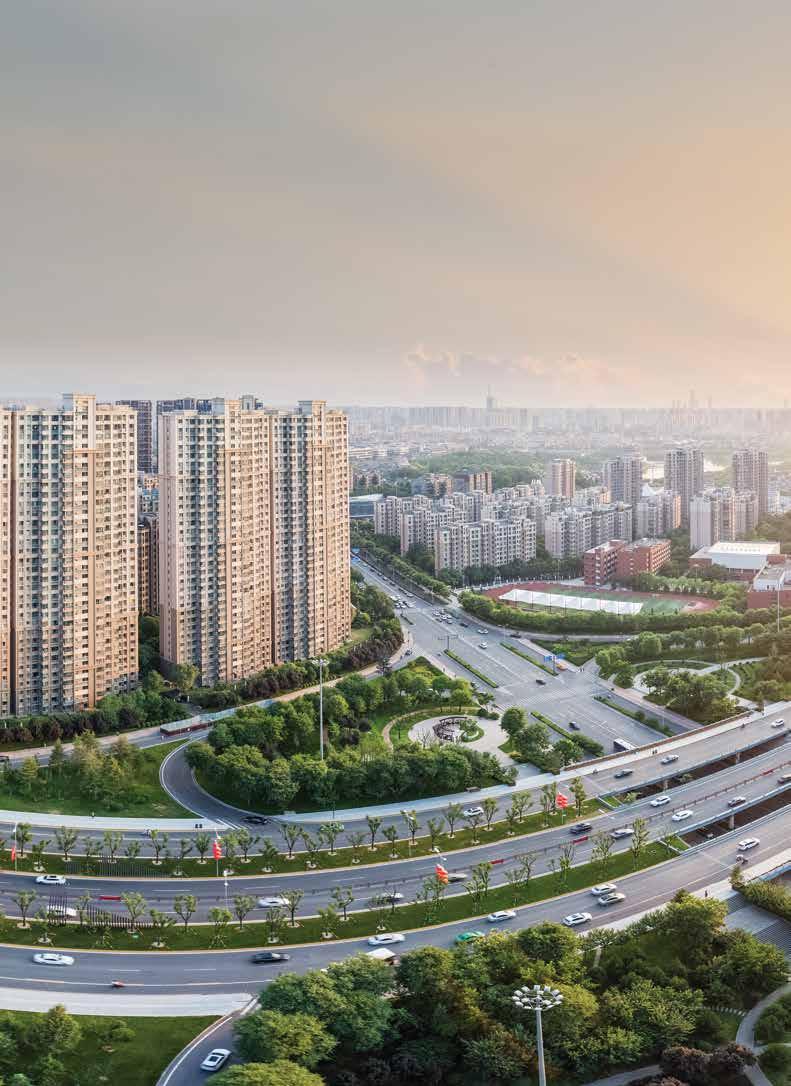 By: Soham Chokshi, CEO & Co-Founder of Shipsy
By: Soham Chokshi, CEO & Co-Founder of Shipsy
Sustainability has become more critical than ever before. But why should we act on sustainability now? What has changed over the past few years that is making supply chain and logistics stakeholders go beyond boardroom discussions and take actions on the ground?
According to a 2023 PwC report Companies in the Middle East are responding with increasing vigor to new demands for changed thinking and stronger action on climate issues. It highlighted that 64% of business stakeholders have adopted a formal ESG strategy in the last 12 months and many are embedding ESG priorities across their organizations. Dynamic delivery landscape, consumer demands, economic benefits, brand conscience, and regulations are five other major drivers of logistics sustainability in the region. Let’s delve deeper.
Everything is moving towards home deliveries. Packet sizes are shrinking. There are faster inventory turns, and goods travel more miles before reaching the end customer. This results in excessive packaging. They'll only increase over the next few years, making it imperative for supply chain stakeholders worldwide to think, plan and act.
Around the world, consumers are becoming increasingly aware of the impact of growing carbon emissions and expect brands to drive more significant focus on sustainability. Hence, expectations around getting shipments in eco-friendly packages and consolidation of orders to reduce packaging and miles travelled are growing.
Another primary reason driving logistics sustainability is reaping actual economic benefits. Businesses across geographies see significant cost savings using electric vehicles for longer deliveries and bicycles for shorter ones.
Many brands today do not just want to be known for selling products. They want to stand for something more and are driving a greater focus on building sustainable logistics practices to respond to climate change and global warming.
This might not be a significant driver now, but as we progress, strict government regulations and UN policies will drive enterprises to pledge to reduce emissions. For instance, in December 2020, the EU had to update the target of reducing global CO₂ emissions by at least 55% from 40% by 2030.

One north star for ensuring sustainable logistics operations is the distance travelled per package. Therefore, businesses must reduce the distance travelled and make the miles travelled greener. Let’s see how.
Territory optimization, efficient route planning, dynamic order batching, and route optimization are four critical ways businesses can significantly reduce the distance travelled.
The system chalks out the shortest route for every vehicle based on these constraints. Thereby reducing the distance travelled and delivery time.
Leveraging advanced territory optimization capabilities helps logistics stakeholders plan resource utilization to serve their demands and cover geographies optimally. Territory and workforce optimization not just reduces emissions but also logistics costs by up to 28%.
Using intelligent route planning, businesses can find the most efficient route based on consignment mapping with the vehicles. Efficient logistics planning and increasing fleet capacity minimize the distance travelled, fuel consumption, and delivery time. It also plans daily routes so that vehicle capacity utilization increases and the number of vehicles required to do the same number of deliveries decreases. As much as a 32% increase in vehicle capacity utilisation can be achieved by using intelligent route planning. This means getting more tasks done but travelling fewer miles.
Dynamic Order Batching
Regarding 30 mins, 20 mins or 10 mins delivery, delivery managers must push towards a dynamic automated order batching environment. It significantly reduces the distance travelled for order picking with similar pickup locations.
Route Optimization
Advanced route optimization empowers delivery managers to allocate orders to specific vehicles/ riders based on constraints like delivery type, order volume, weight, costs, rider proximity, traffic considerations, etc.
All EVs ensure zero tailpipe emissions. An intelligent logistics management platform helps delivery managers prioritize allocating orders to electric vehicles over conventional means based on predefined distance limits.
Partnering with the Right Carrier
We see more customers using automation and analytics to partner with carriers using sustainable fuel usage practices.
Leveraging Bicycles for Short Distances
Logistics stakeholders can seamlessly allocate short-distance orders to bicycle riders using advanced route planning and optimization solutions. For instance, any distance less than 5 km can be assigned to a rider using a bicycle.
Better communication between the drivers and the end customers ensures fewer delivery attempts and boosts first-attempt success rates, thereby reducing the distance travelled. Also, businesses can minimize delivery failures and repeat delivery instances by using advanced geocoding and arresting suspicious delivery attempts.
To sum it up, technology will be crucial in reducing carbon emissions from logistics activities. With advancements in data analytics, automation, and intelligent logistics solutions, businesses can optimize routes, consolidate loads, and improve resource allocation.
In an era marked by remarkable technological strides, the GCC finds itself on the cusp of transformative shifts. The integration of cutting-edge technologies into smart cities and public services is heralding a new era of efficiency and innovation. With this, Operational Technology (OT), Cloud Technology, and Internet of Things (IoT) are emerging as some of the key enablers behind major smart city initiatives, going hand in hand with the push toward 5G adoption, which is expected to reach 16% in the GCC by 2025.
As smart infrastructure becomes more prevalent, the threat landscape continues to evolve, posing greater risks to industrial processes, public services, and even personal safety. The rapid adoption of cloud technologies in the GCC has not gone unnoticed by cyber criminals keen to leverage attacks against cloud-based infrastructure. Within the realm of critical infrastructure, IoT devices designed to monitor and manage infrastructure expose potential vulnerabilities for cyber criminals leading to security breaches.
Traditional cybersecurity measures, often focused on IT systems, struggle to adequately protect the diverse range of cloud, OT and IoT Infrastructure systems.
The vulnerabilities arising from the interconnectedness of OT and IoT systems are significant. Unlike traditional IT networks, OT and IoT environments present unique challenges due to the diversity of devices, legacy systems, and real-time operational requirements. The traditional cybersecurity measures that once sufficed for IT systems struggle to protect the diverse array of OT and IoT devices that control critical infrastructure.
The precarious balance between innovation and security underscores the importance of advanced security measures in safeguarding technologies from evolving threats. Thus, bespoke Managed Detection and Response (MDR) is emerging as a crucial shield against escalating cyber threats targeting cloud, OT and IoT systems, ensuring that the promise of these technologies isn't overshadowed by security risks.
With its comprehensive cybersecurity approach that focuses on continuous monitoring, advanced threat detection, rapid incident response, and remediation, MDR is offering a robust strategy for CISOs to counter the escalating sophistication of cyber threats. Designed to address the intricacies of IT environments, its benefits also encompass continuous improvement with the application of threat intelligence and adaptability to the unique demands of cloud, OT and IoT systems.
As we edge closer towards a smarter future, questions remain about how to ensure smart cities actually improve the lives of their citizens through innovations such as predictive traffic management and autonomous vehicles for better mobility.

Web3 has emerged as potentially innovative towards building and running efficient smart cities. The reality is that 5G connectivity, sensor data, and artificial intelligence (AI) are only part of the solution to making people’s lives more sustainable and enriching. Without the solutions that Web3 enables — namely, decentralised governance, financial infrastructure, tokenised assets, and other decentralised infrastructure like marketplaces — we risk smart cities falling victim to the same problems faced by their predecessors.
A surprising fact given the traditionally opaque and inefficient nature of civic governance. Over the last half decade, we’ve seen what Web3-powered decentralised autonomous organisations (DAOs) can do in terms of making treasury management and decision making more transparent and democratic. The same model can be applied to civic governance.
The centralisation of financial services has limited any hope of interoperability. Apps and services don’t talk to each other, citizens need accounts with multiple platforms, and fees tend to be high because they need to cover overhead. It would be a wasted opportunity to build a smart city on top of our existing financial infrastructure.
Smart cities would also benefit from decentralised ownership. Assets like property, vehicles, contracts, and memberships could be more efficiently managed and transacted if tokenised as fungible or non-fungible tokens (NFTs). All in all, a smart city can’t make the necessary improvements to the lives of citizens if governance remains opaque, financial infrastructure centralised, assets offchain, and marketplaces inaccessible. They can’t make transformative improvements in efficiency without interoperability. Web3 is designed to address these specific challenges. It’s time smart city planners take a long look at how they can leverage Web3 to make the cities of the future more equitable and transparent.
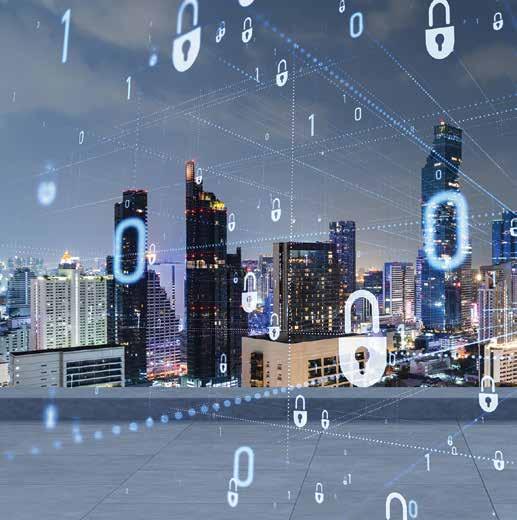 By: Ozgar Danisman VP – Sales Engineering, Europe, MEA, Forcepoint
By: Ozgar Danisman VP – Sales Engineering, Europe, MEA, Forcepoint
The Middle East is fast becoming synonymous with the development of smart cities – those super sustainable destinations where automation and digitisation is leveraged and pursued to improve the lives of those who live, work, and play within them. The Gulf in particular is at something of an advantage being able to create from the ground up rather than retrofitting technology into legacy – and sometimes even historic – infrastructure.
Abu Dhabi’s Masdar led the way and Saudi Arabia’s ambitious NEOM and The Line giga projects make headlines the world over. Smart cities promise a completely new way of living and working, utilizing clean energy, using advanced cloud solutions, generative AI, IoT, and robotics to deliver increased hybrid or remote working, low carbon transport solutions, technology advanced homes that are easy to run, civic services available at the touch of a button, and so much more. They have at their core a central ambition to create 21st Century utopias.
These hyper-connected cities will also be equipped with data capturing technology aimed at keeping everyone safe. Digital cameras
and both facial and vehicle recognition will go a long way to outlawing conventional crime and stopping road traffic accidents in their tracks, but with more autonomous vehicles on the roads, such incidents are expected to decrease considerably. But just how safe they are remains one of the key questions.
Smart cities come with risk. Everyone living, working, or even visiting smart cities will have their personal data captured and that poses risks to them and to city operators. Smart cities are becoming increasingly attractive to another demographic – albeit an unwanted one – the cybercriminal. These dark actors, never captured on camera, are becoming ever-more sophisticated, and the lure of hacking and capturing smart cities’ troves of data and holding civic operators to ransom seems to be a temptation too good to ignore for cyber criminals.
No wonder then the average smart city resident or visitor needs to consider how they feel about their data potentially being unlawfully seized and exposed
on the dark web with all the individual breach consequences that could involve. As for the highly digitised and automated businesses and infrastructure suppliers in these cities, hackers can bring utilities and services to a grinding halt with all the risks, residents’ fury, reputation damage, and costly remediation that comes in its wake.
So, the case for prioritizing cybersecurity in smart city infrastructure planning and the building of a regulatory framework to govern it, looks to be a no brainer. Yet, according to expert Chris Teale of Smart Cities Dive –the online resource that deep dives into smart city development – cybersecurity is not at the top of planning agendas. In the US there have been a slew of ransomware attacks on smart cities with some paying out huge figures to get their data back. Some cities have even now resorted to recruiting hackers as consultants to help them build a cybersecurity infrastructure that limits the risks for the city and all in it.
Teale puts cybersecurity’s agendaranking relegation down to two factors. Firstly, cybersecurity is complex when looked at in context of guarding an entire inter-connected city’s infrastructure. And secondly, cybersecurity can be costly. Both these reasonings have merit, yet do they supersede the risks? We think not.
The reality is that smart cities comprise an amalgamation of cyber risks and each should be addressed during the design phase to ring fence safety-critical services. Cybersecurity can ensure cyberattacks can be mitigated or that even if the worst should happen and essential services and infrastructure are disrupted, resilient, fail-safe systems spring into action to protect everyone from harm.
Addressing cybersecurity from the planning outset with Zero Trust Architecture (ZTA), which denies unauthorized and unverified access, is vital and relieves cities from having to
retrofit controls that will likely prove more complex and costly in the long run. Forcepoint's Zero Trust CDR solution is an example of proactive cybersecurity measures that can be taken to safeguard organizations against potential cyber threats. It closes the inbound channel by prohibiting all executable orders from entering an organization via email, and web channels and uses secure import mechanisms to ensure that the documents that enter the organization are from trusted sources.
The forecasts from the International Security Forum point to more reasons why cybersecurity must be a key design consideration: The threat landscape is diversifying significantly, with drones, 5G, and Artificial Intelligence unlocking new attack vectors. Unsurprisingly, the Middle East, with its rapidly digitising economies, is increasingly a key target.
Now is the time for city planners to prioritize cybersecurity and developers to “invest now in security-by-design” to reduce the risk of compromise and ensure secure operation of these smart cities. When it comes to smart cities, the smart money is on cybersecurity.

An exclusive interview with The Integrator, Pagero's Chief Product Officer, Gustav Dahllöf, discusses their mission to become the world's largest open business network, simplifying the buying and selling process. They are revolutionizing invoicing processes with innovative solutions, boosting operational efficiency, and cost savings. Moreover, Pagero is leading the way to a paperless, greener, and more sustainable business world!

How does Pagero help companies go digital, and what are your offerings?
The core concept of Pagero is to make buying and selling easier. Digitalisation trends are changing the way companies and consumers want to do business, with expectations growing every day in terms of efficiency and reliability. That is why we have designed Pagero to be a cloud-first, open business network where buyers and suppliers can exchange business documents such as invoices, orders, and confirmations, in compliance with regulations set by the tax authorities in the 140+ countries where our clients do business.
At Pagero, we provide a comprehensive range of solutions that align with current industry requirements. One of our main offerings is our e-Invoicing solution, empowering organizations to streamline their invoicing processes, enhance operational efficiency, and achieve cost savings. Furthermore, we have solutions that expand these digitalization efforts towards the full Purchase-to-Pay and Order-to-Cash processes. In addition, we offer a wide range of value-added services, including e-archiving, e-payment, business intelligence, validation, and enrichment services. Our ultimate goal is to establish ourselves as the world’s largest smart, open business network - making buying and selling easy!
Tell me about Pagero's e-invoicing platform and how does it streamline invoicing and improves efficiency.
Pagero's e-invoicing platform is a cuttingedge digital solution designed to optimize and simplify the invoicing process for businesses. By enabling seamless electronic transmission of invoices between suppliers and buyers, the platform eliminates the need for manual paper-based invoicing, reducing processing time and errors significantly.
The key advantages for businesses in adopting e-invoicing include:
• Enhanced accuracy and data integrity
• Faster invoice delivery
• Reduced administrative costs
AT PAGERO, OUR GOAL IS TO MAKE BUYING AND SELLING EASY.
With streamlined invoicing procedures, businesses can experience improved cash flow due to faster payment cycles and reduced payment delays, ultimately fostering better relationships with trading partners.

How does Pagero promote environmentally friendly business practices beyond e-invoicing? What initiatives have you taken to provide a sustainable business ecosystem?
Beyond our core e-invoicing services, we actively promote and support environmentally friendly business practices through several initiatives and features aimed at reducing environmental impact. Our commitment to paperless document management encourages companies to transition to digital solutions, saving trees and reducing carbon emissions linked to paper production and transportation.
Additionally, we provide an environmental dashboard free of charge to all customers, allowing them to track the environmental savings achieved by switching from paper to electronic processes. Our dedication lies in creating a greener and more sustainable business world!
How does Pagero's platform accommodate businesses of different sizes and industries?
Our platform is designed to offer seamless scalability and integration, making it suitable for businesses of varying sizes and industries. Its flexible architecture allows it to handle both
OUR GOAL IS TO BUILD THE WORLD'S LARGEST OPEN BUSINESS NETWORK, EMPOWERING BUSINESSES WITH INNOVATIVE SOLUTIONS.
small businesses with limited transaction volumes and large enterprises processing a high volume of transactions. For small businesses, Pagero provides a straightforward onboarding process and user-friendly interfaces that require minimal technical expertise.
As companies grow, Pagero's platform can effortlessly accommodate increased transaction volumes and more complex workflows without compromising on performance or efficiency. Moreover, Pagero's integration capabilities enable it to seamlessly connect with various enterprise resource planning (ERP) systems, financial software, and other essential business tools, ensuring smooth data exchange and reducing manual intervention.
How does Pagero ensure compliance and legal certainty on their platform, and what steps are taken to minimize the risk of noncompliance?
Our platform is designed with security and data protection in mind, employing encryption and authentication protocols
to safeguard sensitive information. Pagero conducts regular audits and assessments, both internally and by third-party experts, to ensure adherence to compliance standards. To minimize the risk of non-compliance, we implement strict internal controls and governance frameworks. Additionally, Pagero provides comprehensive training and support to our users, ensuring they understand and follow compliance guidelines.
How does Pagero's reporting and analytics tools help companies optimize workflows and make informed decisions with improved data visibility?

Pagero's reporting and analytics platform play a crucial role in enhancing data visibility for companies. By providing comprehensive insights and real-time data analysis, these tools enable businesses to gain a deep understanding of their operations, identify trends, and pinpoint potential inefficiencies. Leveraging this information, companies can optimize their workflows by streamlining processes, automating repetitive tasks, and improving collaboration among teams and partners. Furthermore, the data-driven insights facilitate informed decision-making, allowing organizations to make strategic choices based on accurate, up-to-date information. This leads to improved productivity, cost-effectiveness, and overall performance, ultimately fostering a competitive advantage in the market and driving business growth.
What are Pagero's plans for expansion and partnerships in 2023 and beyond?
We have certain exciting plans for significant expansion and strategic partnerships in response to the rapidly evolving global landscape. With the increasing adoption of e-invoice mandates across the GCC and the world, and the growing trend of digitalizing business processes, Pagero is positioned to lead the way in this transformation. Through strategic partnerships, we aim to enhance our technological capabilities and broaden our reach. Our goal is to build the world's largest open business network, empowering businesses with innovative solutions that can facilitate seamless digital transactions and drive economic growth.
Contact

How has the concept of smart cities evolved over the past decade, and what do you see as the most significant advancements in this field?
Ten years ago, the concept of a smart city was a nice topic to “explore” by city officials, with few real implementations around the world. One of the main reasons for that was the lack of a clear definition of what constitutes a smart city. Many cities focused on the technology aspect of a smart city, conducted trials and ended up with small siloed systems in production.
Today, almost every major city has a goal to become a smart city. Every city is looking to integrate their sub-systems in what is known as an “Integrated Operations Center” (a.k.a. City Operations Center) which has become a must to achieve true smartness in a city. Another significant advancement for cities is the move to a “data-driven” city, where the city relies more and more on data to make decisions, both on the strategic and operations day-to-day levels.
Considering the complexity of the META region, what are some unique challenges and opportunities in deploying smart city solutions there?

The META region has always been unique when it comes to doing business, are cities are no exception. We have seen an increased interest in implementing smart cities in the region in the past five years. The level of maturity of the implementations has also significantly increased, fueled by allocated budgets for city projects and the fact that cities were a greenfield when it comes to technology. The region has attracted international talent and know-how, allowing it to enhance the local talent knowledge and move faster into implementations.
When it comes to challenges, I would say that “government processes” and “outdated regulations” can sometimes slowdown the journey, although this is changing fast as governments realized the need to change and embrace technology as the main tool in their digital transformation!
What role does Dell Technologies play in advancing smart city initiatives?

Dell Technologies has a global “Digital Cities” team headquartered in Singapore, considered among the smartest cities “nations” in the world. Our global team interacts with cities and acts as a hub to share experiences/ lessons learned with cities as they go through their smart city “journey”. Infrastructure plays a major role in cities
and we focus on helping cities build scalable, open, future-proof and resilient infrastructure. Through our eco-systems of technology partners, we advise cities on how to build validated solutions in the domains of Public Safety, Urban Mobility, e-Government and Sustainability.
How is AI playing a transformative role in shaping the future of smart cities?
Data is the most valuable asset of a smart city. Coupled with Artificial Intelligence (AI), both are playing a pivotal role in shaping the future of smart cities, transforming them into more efficient, safer, and more livable environments. To succeed in harnessing the power of AI, cities need three ingredients: data, powerful compute and AI algorithms. Cities collect vast amounts of data, whether from government systems, legacy city systems and modern Internet of Things (IoT) platforms. Today’s powerful compute systems have never been as available and affordable. AI algorithms have become very advanced and within the reach of every organization. The latest Generative AI (GenAI) developments have got every city thinking how to integrate it in the city systems. We are actually just scratching the surface when it comes to Generative AI : Imagine the value brought to a city decision maker who can query a chatbot which have learned from 50 years of city data! This is a simple use case for GenAI in cities!
As AI becomes more integrated into smart city infrastructure, privacy becomes a major concern. How do you address the security challenges associated with AIpowered systems to safeguard city data and citizen privacy? This is an evolving field and new developments are happening every day. Some countries are looking to regulate the use of AI whereas others are more concerned with accelerating AI development, with little or no consideration to regulating it. Learning about the AI technology, asking the right questions to AI companies, and asking about accountability of AI systems are some of the things that city officials need to do. Regulation needs to evolve very fast to keep pace with the developments in AI. I see this a challenge for many cities: on one hand, regulation will help preserve the privacy of citizens, but on the other hand, too much of it could cripple the development and use of AI systems! Successful smart cities are likely the ones who will succeed in striking a good balance between regulation and use of AI.
"ALMOST EVERY MAJOR CITY HAS A GOAL TO BECOME A SMART CITY."
Global Energy and Environmental Engineering Services is a multinational consultancy and solutions provider in sustainability, environment, and engineering. The Integrator goes in for a quick interview with Satyapal Singh, CEO and Directior- GE3S

How is NEOM different from other projects around the world?
A cutting-edge metropolis characterized by avant-garde technologies fueled by NET-ZERO emission energy, NEOM is undergoing development in adherence to elevated sustainability benchmarks that are deeply attuned to human values. Upon completion, it has the potential to emerge as a groundbreaking marvel on the global stage.
What new approach is it bringing to urban development?
Traditionally, global urban development has unfolded in a mixed-use manner, sprawling expansively both horizontally and vertically. NEOM, in contrast, introduces a paradigm shift by emphasizing the reduction of land footprint and the establishment of a self-sustaining circular economy within its designated developmental expanse.
Could you help us understand what sort of transportation technology would be used in these smart cities?
NEOM comprises four distinctive precincts: The Line, Oxagon, Sindalah, and Trojena. Among these, The Line stands as an audacious endeavor, spanning 170 kilometers in length. Distinguished by its resolute commitment to renewable energy, it aspires to achieve a carbon-neutral status. Remarkably, The Line envisions an environment where automobiles are eschewed, fostering a pedestrianfriendly realm where every essential amenity is within a mere five-minute stroll. This visionary urban construct further endeavors to facilitate seamless travel from one extremity to another within a brisk 20-minute interval.
What sort of engineering technology is being used to develop these cities?
An array of advanced technologies is being harnessed to meet the diverse requirements of NEOM City across the following domains:
• Advanced solar technologies
• Desalination water
• High-speed rail
• Cognitive technologies
• 5G hyperconnectivity, AI and advanced robotics, augmented and virtual reality etc.
• Green hydrogen production
• Indoor farming / Greenhouse
• Smart building
What environmental challenges do you see in these revolutionary cities that are coming across the world?
New developments inevitably bring forth environmental challenges, and NEOM is no exception. Yet, by strategically deploying eco-friendly technologies and astute management approaches, these challenges can be mitigated to an acceptable degree. Notably, the region's scarcity of fresh water resources and minimal rainfall underscore the paramount importance of addressing water demand and the reclamation of wastewater for reuse within the NEOM cityscape. While desalination will suffice for potable water needs, considering supplementary measures like a transnational water network to import fresh water from neighboring countries remains a pivotal consideration for the future.
Do you find people eager to know more about such developments and what is the message would you like to convey to people reading you through this interview?
Wherever people hear about NEOM's story, it sparks amazement. This monumental endeavor, unlike anything before, captures people's curiosity, fueling their eagerness to witness its evolution. This project tests the boundaries of human potential, showcasing what we can achieve through collaboration. I'm confident that NEOM's growth will inspire future generations, showcasing the capabilities of our ancestors. Now is the time for researchers, entrepreneurs, investors, and individuals to engage in this transformative journey, embracing a new way of life as it unfolds.
The significance of cybersecurity in guaranteeing the safety and resilience of smart city infrastructure cannot be overstated. The potential risks and threats that smart cities face, particularly in the context of emerging technologies like 5G and IoT, are substantial. In these Q&As, we delve into how NETSCOUT, a provider of cybersecurity solutions, tackles these challenges through their monitoring and protection solutions. The Integrator conducted an interview with Gaurav Mohan, VP, SAARC and Middle East at NETSCOUT, to provide you with a better understanding of these technologies and how to enhance cybersecurity measures within our smart cities.
 Gaurav Mohan, VP, SAARC and Middle East, NETSCOUT
Gaurav Mohan, VP, SAARC and Middle East, NETSCOUT
Why is cybersecurity crucial in ensuring the safety and resilience of smart cities infrastructure?
Cybersecurity is crucial in ensuring the safety and resilience of smart cities due to the increasing reliance on advanced technologies like 5G, IoT, and cloud systems. As smart cities implement these technologies to improve various services and experiences, they also become vulnerable to cyber threats. With the interconnected nature of devices and networks, potential attackers could exploit vulnerabilities to disrupt critical services, compromise personal data, and even gain unauthorized access to sensitive systems.
There is a high need for robust security measures to protect these components from cyberattacks. Without proper cybersecurity, these interconnected systems could be susceptible to hacking attempts, data breaches, and other cyber incidents .
What are the potential risks and threats faced by smart cities infrastructure, and how does NETSCOUT address them?
There are various risks that smart cities' infrastructure could face, ranging from DDoS attacks to data branches, cyberattacks, and privacy concerns.
NETSCOUT addresses these risks and threats through its scalable Visibility Without Borders monitoring solution. This solution is designed to provide actionable insights into network and application performance, helping smart cities identify and respond to cyber threats effectively.
This allows city administrators and cybersecurity professionals to quickly detect anomalies, pinpoint potential breaches, and respond to cyber incidents before they escalate.
As smart cities integrate emerging technologies like 5G and IoT, how does NETSCOUT ensure compatibility and protection against unique cyber risks associated with these technologies?
As Middle Eastern smart cities embrace emerging technologies like 5G and IoT,
NETSCOUT is well-equipped to ensure compatibility and protection against the region's specific cyber risks. NETSCOUT has a deep understanding of the technologies of 5G, 5G Advanced, 6G, and IoT. This knowledge allows NETSCOUT to develop solutions that are specifically designed to monitor and secure these technologies. The Visibility Without Borders solution offers comprehensive visibility into the network infrastructure, applications, and services within a smart city environment. This ensures that all components, including those related to 5G and IoT, are monitored and protected.
As smart cities continue to evolve and expand, NETSCOUT’s scalable solution can grow with the city's infrastructure, ensuring that compatibility and protection remain effective even as the technology landscape changes.

advice
smart city authorities and stakeholders to strengthen their cybersecurity posture
For smart city authorities and stakeholders in the Middle East, cybersecurity is not only integral but also a strategic imperative. Investing in robust cybersecurity solutions, conducting regular risk assessments, and implementing best practices for secure infrastructure are essential steps. Collaboration with experienced cybersecurity partners can provide valuable insights and expertise to strengthen the overall cybersecurity posture of smart cities. Additionally, fostering a culture of cybersecurity awareness and training among employees and citizens is crucial for maintaining a secure and resilient smart city ecosystem.
Overall, the roadmap to a secure and resilient smart city ecosystem marries technology, strategic collaboration, and a culture of cybersecurity vigilance. As smart city initiatives evolve, cybersecurity remains the steadfast cornerstone that ensures the promise of a connected, efficient, and secure urban landscape.
shoulders with industry trailblazers, luxuriate in world-class amenities, and thrust your brand into the spotlight before potential patrons and collaborators.
The Corporate SME Open 2023's rewards stretch far beyond the greens. Here's what's in store for attendees:
• Networking: Engage and interact with SMEs and vanguards across industries.
• Exposure: Showcase your brand to a captivated, laser-focused audience.
• Growth: Cultivate fresh partnerships and unearth untapped business prospects.
• Hospitality: Immerse yourself in a day of opulence, delight, and toptier service.
In the dynamic abode of business, standing out, forging bonds, and propelling growth have never been more critical. While traditional networking events serve a purpose, what we currently need is a realm where connection, expansion, and entertainment converge seamlessly. That’s where Linked19H comes to play— the catalyst for this transformative shift.
Linked19H isn't just a brand; it's a visionary force revolutionizing the corporate landscape. By carefully bringing together sports, leisure, and entertainment, we're sculpting unprecedented experiences that serve as hubs for connection and evolution through shared adventures.
Energized by Linked19H, the Corporate SME Open 2023, a premier corporate golf event, will unfold at the prestigious Jumeirah Golf Estates on December 14, 2023. Here's your chance to rub

The Corporate SME Open 2023 isn't just an event; it's a conduit to empower your enterprise and expand your horizons.
The Corporate SME Open stands as a premier avenue for robust business growth, catering to enterprises of all scales. Through the SME Entry Package, Small and Medium Enterprises can participate in an elite corporate golf tournament, enjoying both event visibility and camaraderie. For brands looking to endorse the event, the event offers unmatched brand visibility, networking, lead generation, and support for the crucial SME community. As a topnotch hospitality event, the Corporate SME Open is guaranteed to provide participants with a memorable event experience.
We invite you to seize the opportunity and journey with us into this new dimension of business brilliance.
We'd love to discuss how we can work together to make the Corporate SME Open 2023 a resounding success. For any enquiries regarding sponsorship or partnership opportunities, contact oliver@linked19h.com
















Zoho Corp., a leading global technology company, launched Ulaa, a privacy-centred browser built specifically to help users secure their personal data and activity by providing a browser solution that universally blocks tracking and website surveillance.

"Privacy continues to be an uphill battle in the world of internet browsers because the model is broken -- browsers are offered by vendors with ad-based business models so the incentive to gather, sell or buy user data is significant. This is meant to leave little room for users to guard their privacy becoming accustomed to sacrificing it in the name of access or convenience," said Hyther Nizam, President, Middle East and Africa at Zoho. "With Ulaa, users
don't have to compromise their privacy to browse the web, which unfortunately has become a surveillance minefield. Zoho's commitment to privacy and a privacy-centric business model allows us to offer a conflict-free, privacycentric browser who value their own privacy and their kids privacy."
The web browser comes equipped with features that allow for privacy customisation, built-in user profile modes, and integrated productivity tools while keeping user data safe and private. Users can also sync browsing sessions between devices -- either an entire browser window or a singular tab -- allowing them to use multiple devices for the same browsing session seamlessly.
Ulaa users can toggle between five unique modes based on their desired browsing experience, with each mode completely isolated from others. The modes include Personal and Work Modes, Work Mode, Developer Mode, Kids Mode and Open Season Mode. Each mode offers a protected browsing experience unique to the type of users or members of the family.
Ulaa comes equipped with tabs management options to view all open tabs in one place to be grouped and organised. It also comes with integrated apps that boost productivity, including Zia Search for existing Zoho users, Text2Speech, and Zoho Notebook, a dedicated note-taking space that works across all tabs.
As the countdown to COP28 approaches the six-month mark, the urgency surrounding the world's significant global stake is palpable. With a collective understanding that swift action is imperative to avert potential catastrophe, Schneider Electric reaffirms its commitment to address climate change and social inequality challenges.
Schneider Electric signed the UAE Ministry of Climate Change and Environment's Climate Responsible Companies Pledge. This commitment binds the company to reducing carbon emissions, adopting sustainable practices, and collaborating to drive the Emirates toward a net-zero future. The agreement establishes a foundation for collective action in transitioning to a sustainable, reliable, and modern energy landscape.
Strong partnerships between public and private sectors are urgently needed, merging streamlined regulatory policies with innovative financing mechanisms that leverage technology, vocational training, and capacity building.

Schneider Electric underscores the joint responsibility of governments and businesses in solving environmental challenges.
The signing of the UAE Climate Responsible Companies Pledge showcases a growing coalition of private sector, NGO, and government representatives committed to sustainable transformation. Through
collaborative climate action. The commitment to sustainability is ingrained in Schneider Electric's core values, evident in their industry-leading sustainability barometer introduced in 2005. With a focus on the UAE, Schneider Electric's Smart Regional Distribution Center in Jebel Ali was lauded for its sustainability efforts. The company's dedication extends to waste reduction, single-use plastic elimination, and innovative projects, including wasteto-energy and biogas-to-electricity initiatives.
Schneider Electric calls for intensified efforts from governments and corporates to accelerate climate action, advocating the deployment of proven digital technologies and increased electrification to decarbonize various sectors.
ServiceNow and Accenture have announced the launch of AI Lighthouse, a first-of-itskind program designed to fast-track the development and adoption of enterprise generative AI capabilities.
Expanding on existing strategic partnerships among ServiceNow, NVIDIA and Accenture, AI Lighthouse will assist pioneering customers across industries in the design, development, and implementation of new generative AI use cases.
AI Lighthouse unites the ServiceNow enterprise automation platform and engine, NVIDIA AI supercomputing and software, and Accenture AI transformation services. The comprehensive offering will let customers collaborate as design partners in architecting custom generative AI large language models (LLMs) and applications to advance their businesses.
“This is a transformational moment for business to revolutionize how work gets done,” said ServiceNow Chairman and CEO Bill McDermott. “In collaboration with our visionary partners, ServiceNow, NVIDIA, and Accenture are forming the market-leading blueprint for AI-first enterprise innovation. We expect the AI Lighthouse customer program to inspire
breakthrough ideas with massive ROI: ‘return on intelligence.’”
“Industries are racing to add generative AI tools to their operations at a faster pace than in any previous technology shift,” said Jensen Huang, founder and CEO, NVIDIA. “NVIDIA, ServiceNow and Accenture are partnering to help customers lead their industries by deploying generative AI tools that harness their own invaluable knowledge to transform the applications they use every day.”
The power of AI Lighthouse program will come to life for enterprise customers by:
• Reducing tedious manual work for customer service professionals, with overviews and insights to help them solve problems faster.
• Deflecting cases by promoting self-service options, empowering people, and delivering engaging experiences with natural human language.
• Generating content automatically, including intelligent search results, work notes, and knowledge base articles.
• Boosting developer productivity with intelligent recommendations for code.
Choosing electric vehicles means being part of a worldwide shift to cleaner, sustainable energy, encouraging others to embrace a greener future.
Fresh news has unfurled its wings, heralding the arrival of the muchanticipated 2025 ESCALADE IQ!
Cadillac's bold innovation has unveiled an inaugural all-electric masterpiece, a reimagining of the opulent realm of the full-size SUV, a confluence of iconic design, superlative craftsmanship, and the zenith of automotive technology.

General Motors pledged in 2021 to make vast majority of their vehicular fleet by 2035, coupled with a carbonneutral vision, glisten like beacons of transformation. The car's futuristic design mirrors the company's dedication to a sustainable tomorrow.
A symphony of commitment resonates on multiple fronts, as both governments and technological behemoths fervently endorse and invest in the rapid advancement of electric vehicle (EV) technology. Among the key concerns, the prowess of fast charging technology takes center stage. Enter the IQ, resplendent in its promise, boasting an impressive approximate range of 450 miles. Noteworthy also is its ability to reclaim 100 miles of range in a mere 10 minutes, all facilitated by pioneering vehicle-to-home bidirectional charging technology.
The Escalade IQ is a big car, that appeals to the new generation of luxury buyers. Scheduled for production in 2024, anticipation beckons as we await its arrival.
The 2025 ESCALADE IQ, with its avant-garde contours and aesthetics, emerges as a tangible testament to the company's unwavering dedication to a sustainable, harmonious future.
BEEAH Tandeef, the waste collection and city cleaning vertical of BEEAH Group, the region’s leading sustainability and digitalisation pioneer, announces a monumental step towards cleaner urban environments with AI City Vision. This groundbreaking AI 360 Camera system for waste collection vehicles, the first of its kind in the region, is set to revolutionise how cities are maintained and waste is managed.
Khaled Al Huraimel Group CEO of BEEAH Group
A standout innovation, AI City Vision processes images and videos captured by 360-degree external cameras with exceptional accuracy. By recognizing conditions such as waste bin status, overflowing waste, and road cleanliness, this AI-driven technology streamlines waste management, leading to significant time savings and smarter asset management. Overflowing bins are logged into a portal, optimising waste collection and cleansing routes. Focusing on the beautification and upkeep of the city, the AI City Vision system aligns perfectly with BEEAH Tandeef's dedication to a cleaner and more sustainable future in the UAE and beyond. This integration with existing waste management systems demonstrates a significant stride towards cleaner cities, fostering a sustainable and circular economy.
Khaled Al Huraimel, Group CEO of BEEAH Group, expressed: “For years, BEEAH Tandeef has demonstrated a tradition of innovation that sets
it apart as an industry leader. Our unwavering commitment to research and development has driven transformative initiatives in waste management practices, ranging from pioneering waste segregation methods to implementing sophisticated recycling technologies. BEEAH Tandeef's consistent drive for innovation has earned it the reputation as the most innovative waste management company in the UAE and the region. We are fully committed to aligning our solutions with the UAE's sustainability roadmap, fostering a cleaner environment, and driving economic prosperity through technological excellence.”
Alongside the groundbreaking AI City Vision system, BEEAH Tandeef also introduced additional innovative solutions. With a Facial Recognition Bus Attendance system, BEEAH Tandeef’s workforce transportation buses are transforming labour management within the industry. This system ensures seamless, accurate and timely attendance records while reducing administrative burdens. Further building on its innovative legacy, BEEAH Tandeef continues to find success with the Smart Bracelet designed for its dedicated labourers. Equipped with real-time tracking and safety assurance mechanisms, this IoTenabled device underscores BEEAH Tandeef's commitment to the safety and welfare of its workforce.

 By: Stiven Muccioli Founder and CEO, BKN301
By: Stiven Muccioli Founder and CEO, BKN301
Financial technology, or FinTech, has emerged as a driving force behind economic growth and innovation in the evolving digital world. As governments attempt to adapt to the changing digital ecosystem, the Middle East has established itself as a thriving financial and technological hub. The MENA region, with its strategic position and progressive legislation, has become primed to lead the digital payments revolution. The change has been being fuelled by a slew of innovative technologies that are redefining the financial environment and allowing businesses and consumers to embrace the convenience and efficiency of digital payments.
The Middle East has made tremendous efforts to embrace digital transformation, which has paved way for considerable
advances in the FinTech industry. With a focus on improving financial services, the region has adopted latest technological innovations such as mobile wallets, contactless payments and blockchain to revolutionise payment processing. These technological advancements have not only eased financial transactions, but it has also improved financial inclusion by providing previously underserved people with access to digital financial services.
As consumer preferences grow, so do their expectations for convenient and secure payment solutions. The advent of e-commerce and the growing reliance on digital services has increased demand for seamless and efficient payment solutions. As a result, the Middle East witnessed the rise of digital payment platforms that provide safe and user-friendly interfaces, allowing users to make payments with ease.
One of the most prominent effects of the Middle East's digital payments revolution has been the growth of financial inclusion. According to a report by McKinsey, despite the high adoption of smartphones in the region, cash continues to dominate the payment landscape, constituting approximately two-thirds of retail transactions. Nonetheless, there is an opportunity for enhancement, as more than half of the survey participants anticipate significant growth in noncash payments in the coming five years.
Among those surveyed, 58 per cent of individuals in the Middle East have a strong inclination towards digital payment methods, with 60 per cent believing that digital wallets will emerge as the primary mode of payment (compared to just 38 per cent in Asia). This indicates a positive shift towards embracing digital payment solutions in the region, potentially reshaping the future of
financial transactions with greater convenience and efficiency. However, statistics from a survey conducted by The Oxford University reveals that 40 per cent of the population in the MENA region are underbanked, on the other hand, a report by the World Bank indicates that 69 per cent of the Arab world population are underbanked.
The region is empowering individuals who were previously excluded from the traditional financial system by pushing digital payments. A number of seamless online platforms are available that facilitate mobile wallets and peer-to-peer payment applications, for example, enabling the unbanked and underbanked people to gain access to financial services and participate in the economy.
The digital payments revolution is not only about consumer convenience; it also has enormous implications for Middle Eastern enterprises. Digital payment systems increase cash flow management and financial transparency by streamlining transactions. As a result, organisations can optimise their operations, reduce costs and expand their consumer base. Furthermore, businesses can get into the burgeoning e-commerce sector, cater to the needs of tech-savvy consumers, and accelerate their success in the digital era by accepting digital payments.
Proactive government initiatives and solid regulatory frameworks are essential for the effective adoption of the Middle East’s digital payments revolution. Governments in the region recognise the need of creating an ecosystem conducive to FinTech innovation and have established legislations to encourage collaboration among financial institutions, technology firms and startups. Sandbox programmes, open banking initiatives and cybersecurity rules are examples of supportive policies that create a balance between innovation and consumer protection.
“58

Robust regulatory reforms are imperative to fully unlock thepotential of investment management in the Middle East. Transparent and investorfriendly regulations will strengthen market confidence, attracting both domestic and foreign investors to actively participate in the region's booming economy. As a result, the Middle East can foster long-term investment strategies by establishing a strong regulatory framework.
The Middle East has long been an economic powerhouse and a global trade hub. The region has attracted investors from all over the world due to its abundant resources and strategic geographical location.
It is becoming clear that diversification is essential for long-term stability. Incorporating a wider range of sectors, such as technology, renewable energy, healthcare, and tourism, is therefore key for the Middle East's investment management industry to succeed in the future. Investment managers have plenty of opportunities to explore and profit from emerging sectors, as governments in the region prioritise economic diversification.
Today, leveraging technology is crucial to the success of the Middle East's investment management industry. Blockchain, AI, and robo-advisory platforms, among other fintech innovations, have the potential to completely transform the investment landscape in the region. Investment managers can streamline operations, improve efficiency, and offer customised investment solutions to their clients.
Bill Qian, Chairman of Cypher Capital said, “The future of investment management in the Middle East holds immense promise and potential. The region can position itself as a dynamic investment location by embracing economic diversification, establishing investor-friendly regulations, leveraging technological advancements, and encouraging international cooperation. With detailed planning and proactive measures, the region can build a thriving and sustainable investment management sector that supports economic growth, generates employment opportunities, and improves the general well being of the public, thereby ensuring a promising future for both the sector and investors.”
LEVERAGING TECHNOLOGY IS CRUCIAL TO THE SUCCESS OF THE MIDDLE EAST'S INVESTMENT MANAGEMENT INDUSTRY.
CapitalBy: Sander Maertens Head of Middle

Online payment fraud has become increasingly prevalent and is growing rapidly, especially during the pandemic when online shopping surged due to store closures. This change in consumer behavior has created numerous opportunities for fraudsters. As businesses adopt simpler payment methods like one-click payments, it becomes crucial to proactively protect against fraud by utilizing appropriate risk management tools and detecting suspicious activities.
Reports from the UAE have highlighted a rise in unauthorized payments from consumer accounts during and after the pandemic, despite the country's strict cybercriminal laws. Fraudsters continuously exploit loopholes in technological advancements.
Given that the UAE is the world's fastest-growing ecommerce market, projected to exceed $8 billion in online sales value by 2025, it is imperative for banks and retailers to safeguard genuine customers and combat fraud across all sales channels. To help with prevention, here are some popular online frauds and tips to avoid falling victim to them.
Card testing fraud is when stolen cards are ‘tested’ to see if they are active. If they are, they can be sold on the dark web for a much higher price than those that go untested. A common way fraudster can see if a card is active is by entering the card details when signing up for a subscription-based service with a free trial. The subscription business then performs a zero-amount transcation before charging the actual
amount to see if the card is active.
Gift cards are very popular in the UAE, with deals and discounts on offer during bumper sales. Unfortunately, gift card fraud is a common way to commit transactional fraud because the cards are hard to trace and aren’t as heavily regulated as debit or credit cards. An example of gift card fraud is when a fraudster uses stolen payment details to buy a product online, and then returns it for a refund on a gift card.
Account takeover fraud is a kind of identity theft that involves fraudsters getting access to shoppers’ accounts and making changes to the account details. Fraudsters can either use websites where shoppers have an account with saved payment details or create websites that look legitimate to steal the credentials of unsuspecting shoppers. As a bank or a retailer, you can use timeline visualization to understand the normal behavior of genuine shoppers and how they differ after account takeovers have taken place.
Many banks have prioritized security over customer experience. As soon as something stands out from normal customers' behaviour, payments are blocked straightaway. Unfortunately, differentiating between fraudsters and customers can be difficult and lead to genuine customers being blocked. This could leave customers unhappy with the transaction experience. The best way to tackle this is to strike a sustainable balance between risk and revenue through detecting, preventing and responding to fraud.
The hospitality sector of Dubai is currently experiencing the positive aftermath of a successful beginning to the year 2023. During the initial half of the year, the emirate has achieved the distinction of hosting an unprecedented count of 8.55 million international overnight visitors, thereby establishing a noteworthy milestone.
The projected landscape for the Middle East in 2030 transcends speculative notions, emerging as a meticulously crafted scenario that integrates technological expertise with a human-centered design philosophy. Here are 6 major smart city projections that will shape the hospitality sector:

1. Seamless Guest Experience: Presently, guests are savoring a seamlessly integrated guest experience, made possible by an array of innovative systems that have revolutionized every aspect of their stay. The implementation of Mobile Check-In/Check-Out, Smart Room Controls, and Keyless Entry systems has not only expedited the check-in process but also provided guests with the convenience of managing their stay from the palm of their hand. The introduction of Virtual Reality (VR) and Augmented Reality (AR) elements has transported guests to new dimensions of engagement, allowing them to preview and customize their accommodations virtually. AI-powered chatbots swiftly address queries and requests, providing real-time assistance and information.
2. Connected Infrastructure: Smart cities in the Middle East will weave a tapestry of connectivity that permeates every facet of urban life. Transportation
The grand tapestry of human progress, few chapters hold the promise of reshaping our lives quite like the emergence of smart cities. These urban utopias are envisioned as harmonious symphonies of technology and infrastructure, designed to deliver unprecedented levels of efficiency, sustainability, and quality of life. As we peer into the horizon of 2030, the Middle East stands at the forefront of this global transformation, poised to craft a future that intertwines smart city ideals with the very essence of hospitality.
By: Thomas Kurian Hotel Manager - LEVA Hotelssystems backed by technology will help achieve seamless efficiency, as autonomous shuttles ferry travelers from airports to hotels and beyond. The hospitality industry, too, will reap the benefits of this interconnectedness, ensuring that every traveler's transition from point A to point B is a fluid, frictionless experience.
The Middle East's commitment to sustainability will form a cornerstone of its smart cities' ethos. Hospitality,


a vital component of these cities, will echo this commitment. An expectation is that by 2030, hotels will showcase energy-efficient designs, harnessing renewable energy sources to power their operations thereby contributing to the region's eco-conscious narrative. Encouraging these aspirations, the 'Dubai Sustainable Tourism Stamp' has emerged as a noteworthy sustainability initiative.
4.Hyper-Personalization:
The heart of the hospitality industry
has always been the art of catering to individual preferences. Smart cities will amplify this art into a symphony of hyper-personalization. Imagine a hotel room that anticipates your needs, adjusting lighting, temperature, and ambiance based on your habits and mood. AI-driven concierges will craft itineraries that resonate with your passions, ensuring that your stay is not just comfortable but deeply engaging.
5. Virtual and Augmented Reality:
Smart cities are destined to be playgrounds of innovation, where reality intertwines with virtual realms. Hospitality leaders will harness the power of augmented reality to provide interactive city guides, transforming the way visitors explore urban attractions. Imagine strolling through historical districts, your AR headset seamlessly overlaying architectural wonders of centuries past. Moreover, virtual reality will offer prospective travelers a glimpse of what awaits, inviting them to immerse themselves in the city's offerings before even setting foot on its streets.
6. Impact on Middle Eastern Economies
Beyond the realms of technology and guest experiences, the emergence of smart cities holds profound implications for the Middle Eastern economies. By 2030, these vibrant hubs of innovation are slated to catalyze economic growth, spurring investment and creating a surge in job opportunities. The fusion of smart city dynamics with the art of hospitality paints a portrait of a future that is both awe-inspiring and deeply human. By 2030, the Middle East's smart cities will breathe life into the dreams of urban planners, technologists, and visionaries alike, as they create spaces where the tangible and the virtual intertwine seamlessly.
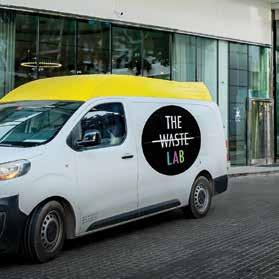
As a part of its ongoing sustainability efforts, known as M1Sustainability, and in line with UN Sustainable Development Goals (SDGs), Media One Hotel has announced a partnership with The Waste Lab, a Dubai-based, women-led, and impact-driven startup that aims to create an opportunity for every food scrap from going to waste. The partnership will look to establish a circular economy, zero-waste solution for managing food scraps, leftovers, and coffee grounds across Media One Hotel venues with a focus on proper food waste segregation

Over the month, it is estimated it will lead to an average minimum monthly collection of 5400kg of food waste that will be repurposed and composted. The Waste Lab will handle the treatment of compostable elements through nature-based composting, fermentation, and other repurposing methods as well as will implement a routing system for collections to minimize the carbon footprint of transportation.
Mark Lee, General Manager, Media One Hotel, said: “M1Sustainable was established at Media One Hotel to help us play our part in protecting the planet one step at a time. As we continue to look to reduce energy, water, food waste and plastic, Media One Hotel is excited about the latest partnership with The Waste Lab to help us reach our goals."
Lara Hussein, Co-founder of The Waste Lab, said: “When it comes to sustainable practices regarding food waste, it is key to start the process at the source of it all for it to be most effective.”
